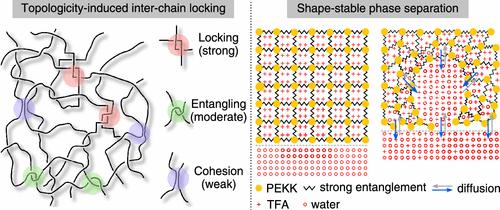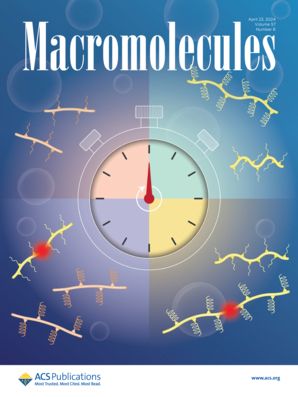Topologicity-Dependent Spinning and Phase Separation toward High-Performance Polyetherketoneketone Fibers
IF 5.2
1区 化学
Q1 POLYMER SCIENCE
引用次数: 0
Abstract
High-performance thermoplastic fibers are very important in widespread applications owing to their excellent mechanical and thermal properties. However, for advanced engineering thermoplastics, melt processing meets severe problems of high melting point and high melt viscosity, and there is a lack of efficient wet spinning due to high indissolubility. Here, we report a novel topologicity-dependent processing for poly(ether ketone ketone) (PEKK), including dissolution, spinning, phase separation, and structural stability. With the randomly appearing para- and meta-positioned ketone groups and high chain rigidity as well, PEKK shows a strong entanglement, namely, molecular locking even after dissolution. Such locking is the real source of spin flexibility, especially for low-concentration solutions. It also causes a special phase separation from which highly porous fibers are spun. By reducing the phase separation rate to realize the overall condensation and a consequent hot stretching, solid fibers with high strength (516 MPa) and stiffness (6.13 GPa) are prepared. PEKK fibers do not show evident viscoelasticity and are mechanically stable within a temperature range of – 196–300 °C, as the topological locking hinders the reconstruction of chain condensation. The locking also retards flame by avoiding chain disassembling. This work provides a new strategy to process thermoplastics by introducing topological structure into polymer chains.

高性能聚醚酮酮纤维的拓扑依赖纺丝和相分离
高性能热塑性纤维由于其优异的机械性能和热性能,在广泛的应用中具有非常重要的意义。然而,对于先进的工程热塑性塑料,熔体加工面临着高熔点和高熔体粘度的严峻问题,并且由于高不溶性,缺乏高效的湿法纺丝。在这里,我们报道了聚醚酮酮(PEKK)的一种新的拓扑依赖工艺,包括溶解、纺丝、相分离和结构稳定性。PEKK具有随机出现的对位和间位酮基团和高链刚性,即使在溶解后也表现出很强的缠结,即分子锁定。这种锁定是自旋灵活性的真正来源,特别是对于低浓度溶液。它还会导致一种特殊的相分离,从中纺出高多孔纤维。通过降低相分离速率,实现整体冷凝和热拉伸,可制得高强度(516 MPa)和高刚度(6.13 GPa)的固体纤维。PEKK纤维不表现出明显的粘弹性,在- 196-300°C的温度范围内机械稳定,因为拓扑锁定阻碍了链结的重建。锁还通过避免链条的拆卸来延缓火焰。这项工作为热塑性塑料的加工提供了一种新的策略,即在聚合物链中引入拓扑结构。
本文章由计算机程序翻译,如有差异,请以英文原文为准。
求助全文
约1分钟内获得全文
求助全文
来源期刊

Macromolecules
工程技术-高分子科学
CiteScore
9.30
自引率
16.40%
发文量
942
审稿时长
2 months
期刊介绍:
Macromolecules publishes original, fundamental, and impactful research on all aspects of polymer science. Topics of interest include synthesis (e.g., controlled polymerizations, polymerization catalysis, post polymerization modification, new monomer structures and polymer architectures, and polymerization mechanisms/kinetics analysis); phase behavior, thermodynamics, dynamic, and ordering/disordering phenomena (e.g., self-assembly, gelation, crystallization, solution/melt/solid-state characteristics); structure and properties (e.g., mechanical and rheological properties, surface/interfacial characteristics, electronic and transport properties); new state of the art characterization (e.g., spectroscopy, scattering, microscopy, rheology), simulation (e.g., Monte Carlo, molecular dynamics, multi-scale/coarse-grained modeling), and theoretical methods. Renewable/sustainable polymers, polymer networks, responsive polymers, electro-, magneto- and opto-active macromolecules, inorganic polymers, charge-transporting polymers (ion-containing, semiconducting, and conducting), nanostructured polymers, and polymer composites are also of interest. Typical papers published in Macromolecules showcase important and innovative concepts, experimental methods/observations, and theoretical/computational approaches that demonstrate a fundamental advance in the understanding of polymers.
 求助内容:
求助内容: 应助结果提醒方式:
应助结果提醒方式:


